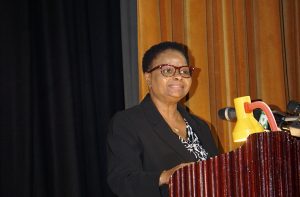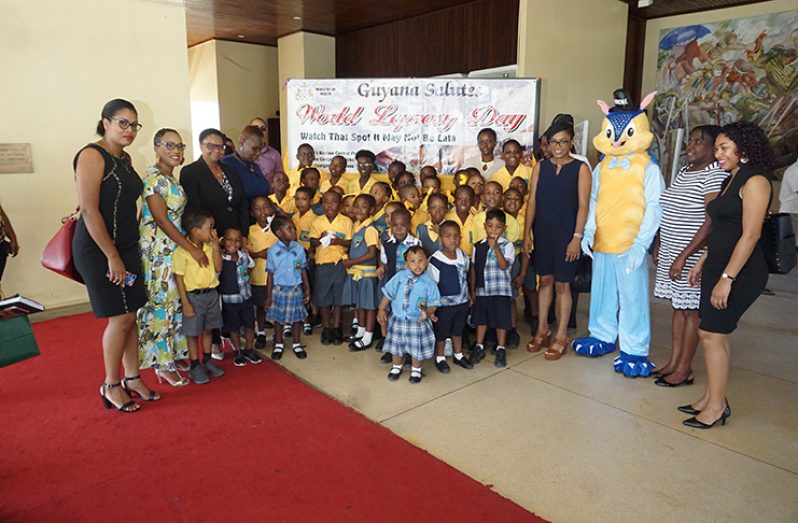MINISTER of Public Health, Volda Lawrence, said that while Guyana is currently in the phase of eliminating Leprosy in accordance with standards established by the World Health Organisation (WHO), stigma and discrimination remain barriers to treatment.
WHO describes Leprosy as a chronic disease caused by a slow multiplying bacillus or a rod-shaped bacterium called Mycobacterium leprae. Due to the nature of the disease, which is also known as the Hansen’s disease, it is transmitted via droplets from the nose and mouth during close and frequent contacts with untreated cases, WHO explained. However, it takes approximately five to eight years to develop while symptoms can take as long as 20 years to appear.
During a ceremony, at the National Cultural Centre, to mark the start of a month of activities in observance of the 68th World Leprosy Day, the Public Health Minister, in her address, said Guyana has recorded significant strides in treating and reducing the prevalence of Leprosy but said there is much more work to be done for total eradication.

When the Leprosy Control Programme was established in Guyana in the late 60s, more than 950 patients with leprosy had registered. To date, there are less than 90 patients on the treatment register. “Many persons affected by leprosy are victims of social discrimination. The theme for this year’s observance is focused on “Stigma and Human Rights of persons affected by leprosy”. Unfortunately, the stigma and fear of rejection and isolation which leprosy still evokes, often keeps people from seeking early treatment,” Minister said.
She said once diagnosed, it is important for persons living with Leprosy to undergo the Multi-Drug Therapy. Early detection, she posited, can result in Leprosy being brought under control.
In 2019, Guyana registered 27 new patients – a reduction, when compared to 50 in 2018. There were 17 males and 10 females – among them two children below the age of 15. In 2015, five children were registered in the Leprosy Control Programme. In providing the statistics, the Public Health Minister said the records show that 88 per cent of the new patients had the severe type of leprosy and eight of those patients when diagnosed had visible disabilities.
“There is still much more work to be done but I have hope and am assured of success, as we in Guyana continue to work with PAHO/WHO declaration in the Global Leprosy Strategy 2016–2020: Accelerating towards a leprosy-free world, which aims to reinvigorate efforts to control leprosy and avert disabilities, especially among our children that are still affected by the disease,” Minister said.
In accordance with the Global Leprosy Strategy, the Public Health Ministry, through the Leprosy Control Programme, has been increasing the number of skilled Leprosy staff, thereby improving treatment and access. In 2011, there was only one doctor attached to the programme but today, that number has jumped to four. One of the nurses, attached to the programme, is currently doing Nursing at the University of Guyana.
“The Guyana Leprosy Control Programme must ensure that anyone affected by leprosy can access his/her medication from their nearest clinic point. We must continue to train community health workers to identify suspected cases of leprosy especially in the outlying areas, and to refer them for treatment. In countries like Guyana, that have reached the elimination levels stipulated by WHO it is essential to ensure that control activities are upgraded, sustained and the leprosy situation is closely monitored,” she underscored.

In going forward, the Leprosy Control Programme will be increasing its partnership with other specialized health programmes (services), such as surgery and ophthalmology, to improve the quality of life for persons living with Leprosy. Minister Lawrence said it is important for persons with Leprosy to be productive members of society. Similar, she said there is need to link the Leprosy Control Programme with vocational training programes, Social Services and community-based rehabilitation (CBR) programmes.
Deputy Chief Medical Officer (DCMO), Dr. Karen Cordon-Campbell, while expressing appreciation to PAHO/WHO for its unwavering support, said Guyana has been supporting positive signs in the reduction of Leprosy. “For us to qualify for this [elimination] we must have a prevalence of less than one case per 10,000 population. As of December 2019, we recorded a registered prevalence of 0.75 per 10,000 population,” she pointed out.
For the downward trend in prevalence of Leprosy to be maintained, the DCMO said Guyana must increase the number of trained staff to diagnose and treat Leprosy; train more patient advocates and counsellors; review its strategies and ensure good maintenance of the Leprosy Register.
In delivering her report, Director of the Leprosy Control Programme, Dr. Heather Morris-Wilson said ending stigma and the laws and practices that discriminate against people affected by Leprosy is essential to achieve zero Leprosy.
“Up to 50 percent of people affected by Leprosy will face mental health issues, such as depression and anxiety. Having been shunned by the family, community and family members, leprosy patients face a high risk of developing psychiatric disorders,” Dr. Morris-Wilson reported.
She was also keen on addressing myths surrounding the disease. The Director reminded that Leprosy is not hereditary and is not as a result of a sin or a curse. Added to that, she made it known that it cannot be transmitted easily. “Leprosy is transmitted by prolonged contact with someone who has the disease and has not been treated. So please remember you cannot contract Leprosy by passing someone on the road or shaking their hand,” she told those present. Importantly, Dr. Morris-Wilson noted that Leprosy is curable with the use of a drug treatment that is free of charge.
PAHO/WHO Country Representative, Dr. William Adu-Krow was among the officials present. The launch also featured cultural pieces by the students of the Rhema Global Academy, Association do Shotokan Karate and Success Elementary School. A mini exhibition was also held.













